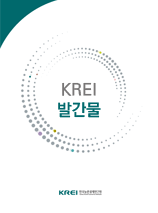


World food supply and demand has been largely balanced over the last 40 years. Despite chronic hunger and malnutrition continuing to surface, overall grain prices have stabilized since the 1970s and the levels of energy intake have improved. But a number of challenges lie ahead: a steady decline in ...
World food supply and demand has been largely balanced over the last 40 years. Despite chronic hunger and malnutrition continuing to surface, overall grain prices have stabilized since the 1970s and the levels of energy intake have improved. But a number of challenges lie ahead: a steady decline in arable areas per capita, stagnant output growth, increasing food demands, declining grain stocks, population expansion, and monopolistic structure in grain trades. In the midst of deteriorating food self-sufficiency, Korea's food state appears to follow suit of the global trend. Adequate policies are also required to address these challenges. Existing market inefficiency must be remedied by reducing food wastes and enhancing physical resources in developing countries. Under the WTO system, it is also important to strengthen disciplines on export ban and restriction and allow flexible measures for grain stockholdings and stable grain supplies.
KREI의 출판물은 판매 대행사 (정부간행물판매센터)와 아래 서점에서 구입 하실 수 있습니다.
| 교보문고 | http://www.kyobobook.co.kr/ |
|---|---|
| 영풍문고 | http://www.ypbooks.co.kr/ |
| 알라딘 | http://www.aladin.co.kr/ |
| 상세정보 조회 | 좋아요 | 다운로드 | 스크랩 | SNS공유 |
|---|---|---|---|---|
| 10451 | 0 | 2 | 0 | 0 |